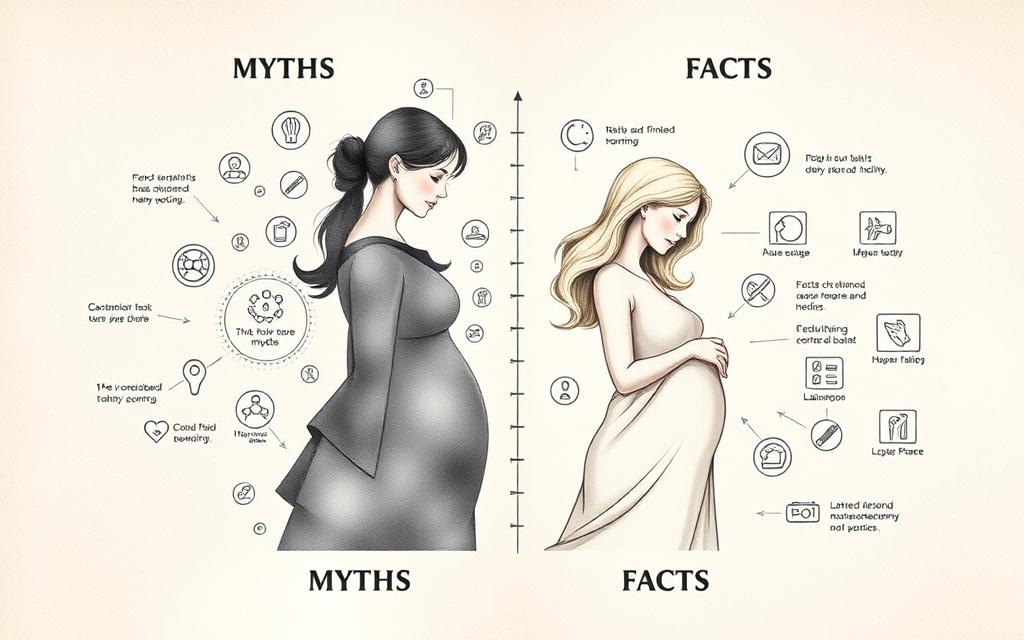Breastfeeding Myths vs. Facts: What You Must Know

As a new mom, it’s key to know the truth about breastfeeding. It’s good for both mom and baby, giving vital nutrients and antibodies. Knowing the facts can help you face challenges and enjoy the benefits of breastfeeding.
This guide will help you feel confident about breastfeeding. You’ll learn about common myths and facts. This way, you can enjoy the many benefits that come with breastfeeding.
Key Takeaways
- Separating breastfeeding myths vs. facts is key for a successful journey and to get the most benefits.
- Breastfeeding is good for both mom and baby, providing essential nutrients and antibodies for growth.
- Knowing the facts can help you overcome challenges and have a successful breastfeeding experience.
- Breastfeeding lowers the risk of diabetes, childhood obesity, and asthma in babies.
- Breastfeeding moms need at least 1,800 calories a day, depending on activity and body size, to support their journey.
- Breastfeeding is linked to a lower risk of sudden infant death syndrome (SIDS) and ear infections in infants.
- Gradual weight loss for breastfeeding moms should not exceed 4–5 pounds a month to keep milk supply up.
Understanding the Impact of Breastfeeding Misinformation
Breastfeeding misinformation can really affect new moms. It can make them doubt their ability to breastfeed well. Many women don’t know the benefits of breastfeeding and might follow myths instead. A lactation consultant or breastfeeding support group can offer great help. They can clear up myths and share breastfeeding tips for success.
Some myths say women with small breasts can’t make enough milk. But studies show breast size doesn’t affect milk production. It’s key for new moms to get the right info and breastfeeding support. This way, they can make smart choices about breastfeeding and get help from a lactation consultant if they need it.
We must tackle these myths and give new moms the breastfeeding tips and support they need. With the right help and resources, women can feel confident in their breastfeeding journey. By supporting breastfeeding support and making lactation consultant services available, we can help new moms reach their breastfeeding goals. This way, we ensure babies get the best start in life.
The Truth About Breast Milk Production
Understanding breast milk composition is key for new moms. It shows the special benefits of exclusive breastfeeding. The milk changes to fit the baby’s needs, giving the right nutrients and antibodies for growth.
Exclusive breastfeeding is advised by groups like Kaiser Permanente and the American Academy of Pediatrics. They suggest it for the first 6 months of a baby’s life.
How often a baby feeds affects milk production. The more they nurse, the more milk is made. This is because lactation depends on the baby’s hunger, and more nursing means more milk.
It’s also important to know that breast size doesn’t matter. Mammary gland size is similar for all women. Breast size differences are mostly due to fat.
Some key facts about breast milk production include:
- Breastfeeding at night helps maintain an ample milk supply
- Going too long between feedings can slow or stop milk production
- Breast milk is always nourishing, and issues with weight gain or milk production are often due to improper latching
By understanding breast milk production and exclusive breastfeeding, new moms can feel more confident. It’s vital to remember that breast milk composition is unique. It changes to meet the baby’s needs, making it essential for growth and development.
Common Breastfeeding Myths vs. Facts: What You Need to Know
As a new mom, it’s key to know the truth about breastfeeding. Many myths can cause stress and make it harder to breastfeed. Knowing the facts about breastfeeding positions can boost your confidence and prepare you for a good breastfeeding experience.
One big challenge for new moms is dealing with common myths. For instance, some think breastfeeding hurts or that certain breast sizes affect milk. But, the right breastfeeding positions and techniques can make it comfortable and successful.
Some common myths about breastfeeding include:
- Nipple tenderness is a sign of poor breastfeeding positions
- Breast size affects milk production
- Breastfeeding is painful and uncomfortable
In reality, nipple tenderness is normal in the early days of breastfeeding. It usually goes away as your body adjusts. Also, breast size doesn’t impact milk production, and the right positions can ease discomfort. By knowing the truth, new moms can face breastfeeding challenges with confidence.
Research also shows that breastfeeding is not directly linked to obesity. The body adjusts milk production based on the baby’s needs. This shows a supply and demand relationship. Understanding this can help new moms make better choices for their breastfeeding journey and overcome common challenges.
Medical Benefits of Breastfeeding for Mother and Baby
Breastfeeding is good for both mom and baby. It lowers the risk of some diseases and boosts brain development. The American Academy of Pediatrics suggests breastfeeding for the first 6 months. They also recommend it for up to 1 year or more.
There are many breastfeeding benefits. These include fewer ear infections, respiratory illnesses, and diarrhea in babies.
Some key benefits for the baby are:
- Lower risk of sudden infant death syndrome (SIDS)
- Lower risk of diabetes, obesity, and certain cancers
- Higher IQ scores in later childhood
- Lower risk of middle ear infections and allergies
For the mother, breastfeeding has many advantages too. These include:
- Faster postpartum weight loss, as breastfeeding burns extra calories
- Lower risk of breast and ovarian cancer
- Lower risk of osteoporosis
- Cost savings, as breastfeeding is a cost-effective option compared to formula feeding
When thinking about weaning from breastfeeding, consider the benefits and risks. The American Academy of Pediatrics suggests breastfeeding for at least one year. They say mothers should keep breastfeeding as long as they and their baby want.
By knowing the many medical benefits of breastfeeding, mothers can feel more motivated. They can make informed decisions about weaning.
Navigating Work and Breastfeeding Success
Going back to work after having a baby can be tough for breastfeeding moms. But, with the right help, they can keep up their milk supply. A study showed that moms with good support are more likely to keep breastfeeding longer.
It’s key to have a plan for balancing work and breastfeeding. This might mean pumping during breaks and knowing how to store milk. A lactation consultant can offer great advice and support, making the transition easier.
Here are some tips for keeping up milk supply at work:
- Pump often to keep milk flowing and prevent discomfort
- Store milk safely to avoid spoilage and contamination
- Talk to your boss and coworkers to create a supportive work space
By following these tips and getting support, moms can face the challenges of working and breastfeeding. They can give their babies the best start with breastmilk.
Building Your Breastfeeding Support System
Being a new mom can be tough, but having a strong support system helps a lot. Breastfeeding tips from lactation consultants, community groups, and your partner are key. With the right people and resources, you’ll feel more confident in breastfeeding your baby.
Finding a lactation consultant is a big step. They offer personalized breastfeeding tips and help with common issues like latching and sore nipples. Community groups and online forums also offer support and a sense of belonging.
- Reaching out to a lactation consultant for one-on-one guidance
- Joining a breastfeeding support group to connect with other new mothers
- Asking a partner or family member to be a breastfeeding advocate and provide emotional support
By taking these steps, you can face breastfeeding challenges head-on. You’ll feel more confident in feeding your baby with the best breastfeeding tips.
Overcoming Common Breastfeeding Challenges
Many new mothers face common breastfeeding challenges, like latching issues and sore nipples. But, with the right techniques and support, these problems can be solved. Knowing about breastfeeding positions and breast milk composition helps new moms tackle these issues and have a successful breastfeeding journey.
Some common problems include sore nipples, low milk supply, and engorgement. To tackle these, new moms can try different positions, like the football hold or cradle hold. Also, understanding breast milk composition helps them see the value of frequent feedings and a good latch.
To beat these common challenges, new moms can get help from lactation consultants, join support groups, or talk to their healthcare providers. With the right support and techniques, new moms can overcome these hurdles and enjoy a successful breastfeeding experience.
| Common Breastfeeding Challenges | Solutions |
|---|---|
| Sore Nipples | Try different breastfeeding positions, use nipple shields or cream |
| Low Milk Supply | Frequent feedings, proper latch, and staying hydrated |
| Engorgement | Use cold compresses, express milk regularly, and wear a supportive bra |
Essential Tools and Resources for Successful Breastfeeding
As a new mom, having the right tools and resources is key. They can greatly impact your breastfeeding journey. You’ll find everything from must-have supplies to digital support apps. These tools help you understand the breastfeeding benefits and the value of exclusive breastfeeding.
Some must-haves include a good breast pump, nursing pads, and comfy nursing clothes. Many moms also find support from lactation consultants or groups helpful. These resources can guide you through any breastfeeding challenges, highlighting the breastfeeding benefits for you and your baby.
For those aiming for exclusive breastfeeding, there’s plenty of help out there. Online tutorials and support groups are just a few resources. With the right tools and support, you can give your baby the best nutrition and enjoy the breastfeeding benefits.

Recommended reading for breastfeeding moms includes books on techniques, nutrition, and parenting. There are also digital support apps that offer tips, advice, and community support. Using these resources can boost your confidence and prepare you for your breastfeeding journey.
Conclusion: Empowering Your Breastfeeding Journey
Starting your breastfeeding journey means you have the power to make smart choices. Knowing the Breastfeeding Myths vs. Facts helps you face challenges with confidence. This way, you can give your baby the best start in life.
Your body is made to give your baby the perfect food. With help from lactation consultants and community groups, you can beat common hurdles. Enjoy the benefits of breast milk, which fights off illnesses and infections.
No matter your situation, like being a working mom or facing special challenges, there are ways to breastfeeding tips succeed. Drink plenty of water, eat well, and listen to your gut. Your breastfeeding path is special, and with the right attitude and support, it can be empowering.






